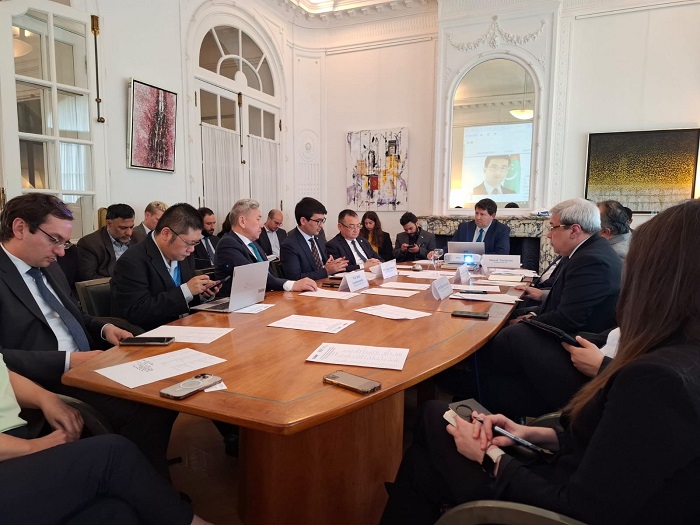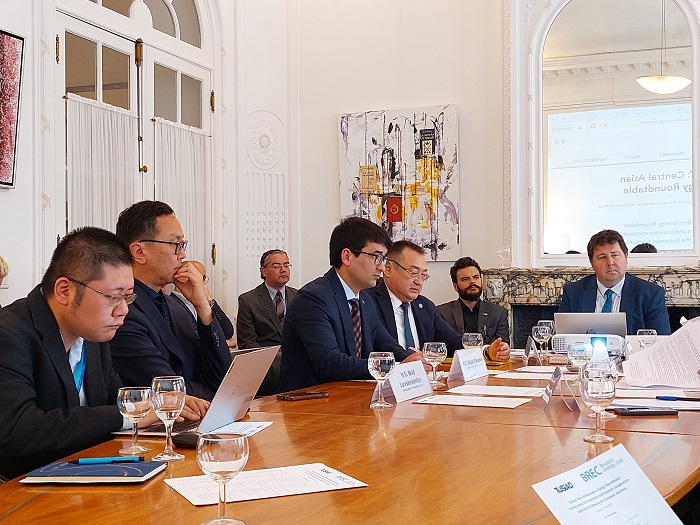 A round table was held in Brussels with the participation of ambassadors of Central Asian countries, Mongolia, heads of European companies and various research institutes on the issues of energy potential and green policy of the Central Asian region.
A round table was held in Brussels with the participation of ambassadors of Central Asian countries, Mongolia, heads of European companies and various research institutes on the issues of energy potential and green policy of the Central Asian region.
The event, moderated by Marat Terterov, founder of the Brussels Energy Club, was aimed at exploring opportunities and challenges in the energy sector, with a special focus on renewable energy and sustainable development.
Ambassador of Turkmenistan Sapar Palvanov made a presentation on the country’s energy policy, emphasizing Turkmenistan’s commitment to diversifying the energy sector and developing renewable energy sources. He highlighted the huge potential of Turkmenistan in the field of solar energy, pointing out that the duration of solar hours in the country reaches up to 3,000 hours annually. This abundance of sunlight makes Turkmenistan an ideal place to implement solar energy projects.
In accordance with this vision, the Law of Turkmenistan on Renewable Energy Sources was adopted in 2021, which regulates legal relations at all stages of renewable energy production and is aimed at attracting foreign investment. A key initiative within the framework of this legislation was the creation of a research and production center for renewable energy sources at the State Energy Institute of Turkmenistan in Mary.
The Ambassador of Turkmenistan also briefed on the country’s efforts to reduce methane emissions and commitments to the Global Methane Pledge. On 16 June 2023, the President of Turkmenistan approved a Roadmap for the development of international cooperation aimed at studying Turkmenistan’s accession to the Global Methane Pledge for 2023-2024. Currently, this initiative is being implemented in cooperation with the US companies to assess methane leaks in the oil and gas sector of Turkmenistan.
 The inauguration of the Arkadag smart city last year, in the construction of which climate-friendly technologies were used, the launch of a hybrid power plant in the Balkan province based on renewable energy sources with a capacity of 10 MW, the construction of a 100 MW solar power plant in the Lebap region were also cited as practical implementation.
The inauguration of the Arkadag smart city last year, in the construction of which climate-friendly technologies were used, the launch of a hybrid power plant in the Balkan province based on renewable energy sources with a capacity of 10 MW, the construction of a 100 MW solar power plant in the Lebap region were also cited as practical implementation.
The round table highlighted the importance of the first meeting of the EU-Turkmenistan Working group on energy, held in April 2024 in Brussels, which was a significant step forward in cooperation between Turkmenistan and the EU. The uniqueness of this working group lies in its comprehensive approach, covering not only fossil fuel resources, but also renewable energy sources and methane emission reduction.
Other participants shared the vision of their countries in the field of renewable energy and sustainable development:
– Kyrgyzstan emphasized the potential in hydropower, solar, wind and geothermal energy, especially noting the Kambaratinskaya HPP-1 hydroelectric power plant project.
-Tajikistan has presented the Rogun HPP, which will significantly increase the country’s electricity production and export potential.
– Uzbekistan discussed key projects in the field of solar and wind energy, highlighting cooperation with international investors and organizations.
– Mongolia underlined the challenges in the field of energy security and current projects to reduce dependence on neighboring countries, emphasizing the role of European companies and banks in the development of renewable energy.
The round table concluded with a general statement on the need to develop a sustainable energy partnership between the European Union and the countries of Central Asia, including Mongolia.
During the discussions, the importance of strategic planning, investment and international cooperation for the transformation of the energy landscape of the region was emphasized. ///nCa, 4 July 2024 (in cooperation with the Embassy of Turkmenistan in Belgium)